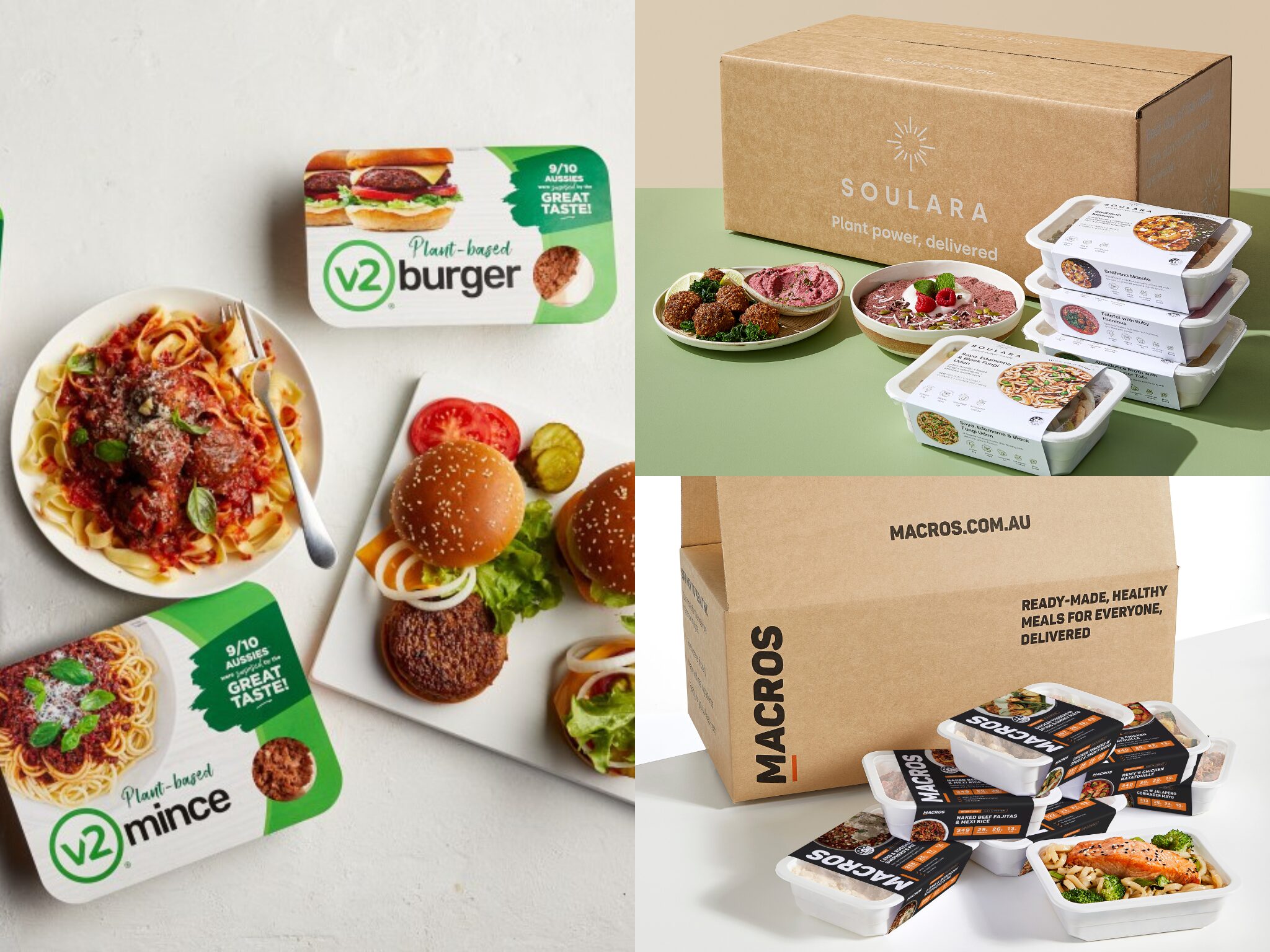Aussie Vegan Meat Maker v2food Acquires Ready Meal Brands as Plant Based Sector Undergoes Consolidation
6 Mins Read
Leading Australian plant-based meat maker v2food has acquired ready meal brands Soulara and MACROS for an undisclosed sum to expand its portfolio, in a sector flooding with M&A activity.
Aussie alt-meat leader v2food has expanded its portfolio with the acquisition of local ready-meal brands Soulara and MACROS, which will help broaden its distribution reach beyond in-person channels via its proprietary D2C e-commerce platform.
Founded in 2019, v2food makes meat analogues like burgers, mince, sausages and schnitzels using soy protein. Now, though, it is diversifying into whole-food plant-based options with the acquisition of Soulara, which offers an extensive range of nearly 40 ready meals. This is an extension to v2food’s own ready-to-eat line, launched in 2022, helping cater to a broader audience and evolving preferences.
“We know consumers have diverse needs when it comes to adopting a plant-based diet,” said Sean Bone, commercial manager at Soulara. “Soulara has carved a niche for itself with its focus on delivering meals designed by our team of chefs and dieticians to ensure best-in-class taste, nutrition and value.”
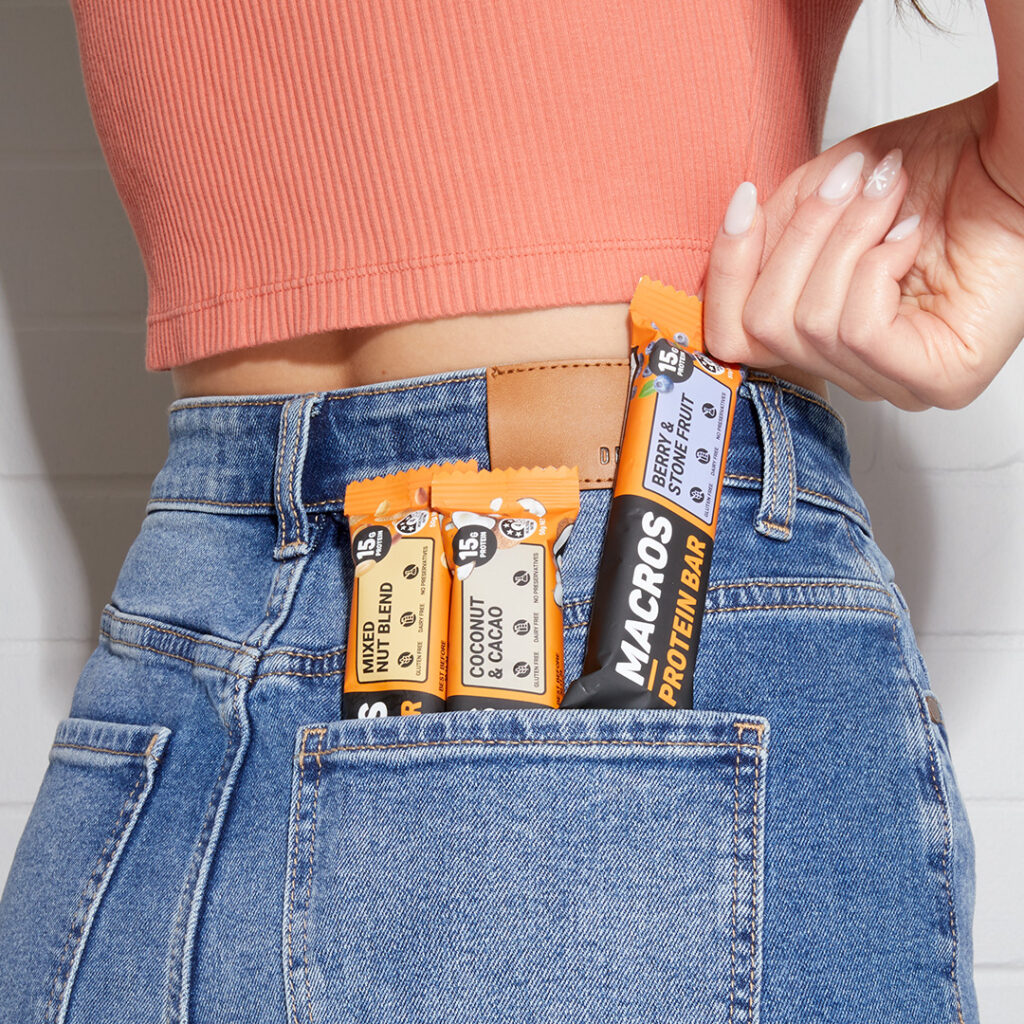
The deal will see Soulara and MACROS be combined under a new entity called Flexitarian Meal Solutions, selling between 50,000 and 100,000 meals per week, a v2food spokesperson confirmed. While they declined to comment on the financial or restructuring aspects of the deal, they acknowledged that while MACROS isn’t a plant-based business, v2food is “excited to explore how to incorporate more plant-based protein solutions in the range to appeal to the growing number of flexitarians in Australia”.
Catering to Australia’s diverse flexitarian and vegan consumers
Founded in 2017 as Freshara, Soulara claims to be Australia’s first plant-based ready meal subscription, with its broad lineup catering to specific consumer needs like high-protein dishes and calorie-controlled meals, alongside both veggie-forward and seitan-centric options. Some of the highlights include a Supercharged Satay, Spaghetti Veganese, African Peanut Stew, and Balinese Mie Goreng.
“We are excited to unite Australia’s number one plant-based ingredients company with Australia’s number one plant-based ready-made meals brand,” said v2food CEO Tim York. “We know consumers want to eat more plant-based products in their diets, but some of the barriers to making this change are concerns around taste and how to cook them – by adding Soulara to our portfolio, we can further demonstrate how easy and delicious meat reduction can be.”
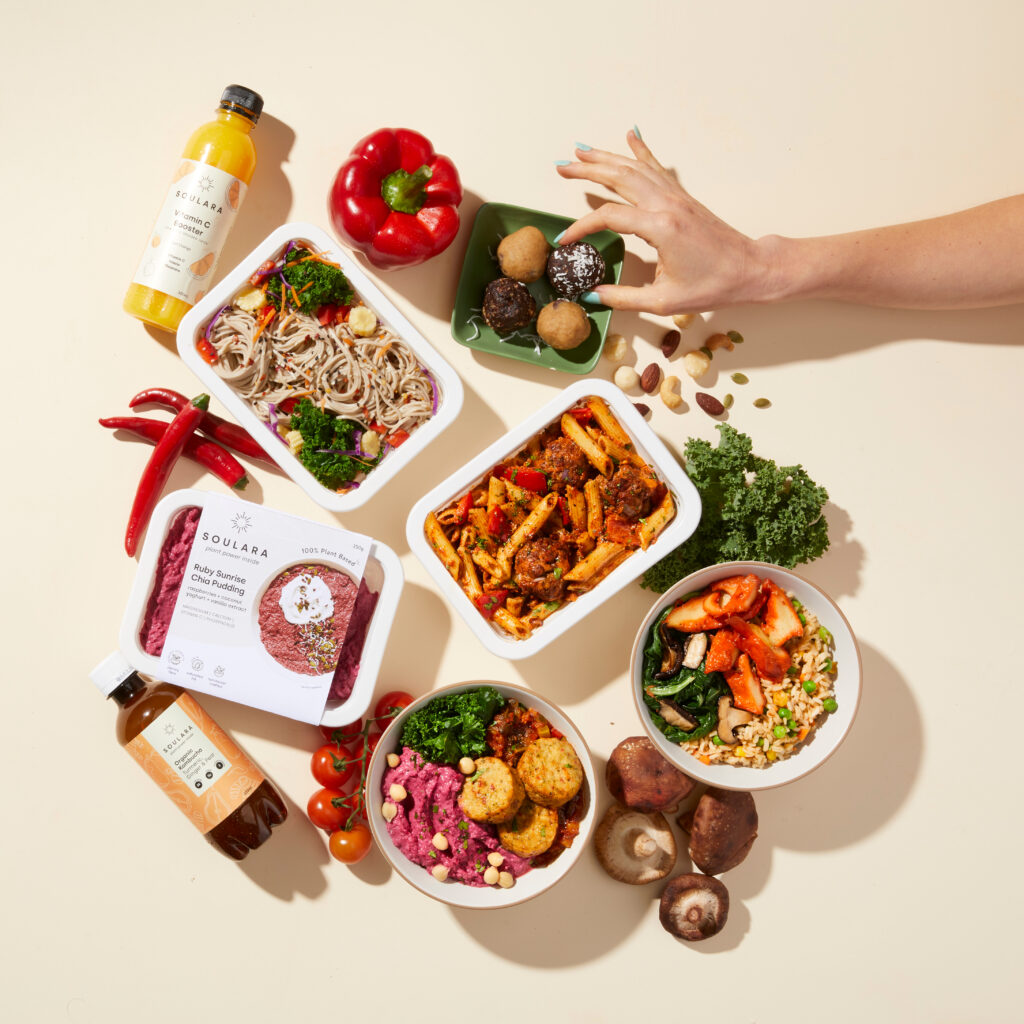
This is a pertinent point when you look at v2food’s latest launch. At SXSW Sydney in October, it unveiled RepliHue, a new colour system for plant-based meat. The company argues that most plant proteins remain the same shade before and after cooking, but through its tech, these can shift hues from raw-looking to brown-grey at the same time and temperature as their conventional counterparts do.
This creates a ‘bleeding’ effect, the same aspect Impossible Foods banks on with its genetically modified soy-derived heme ingredient. RepliHue is derived naturally from red algae and other plants, and has the ability to consume carbon dioxide and use light for energy. v2food argues that its innovation also improves the taste and texture of alt-meat, which is a crucial consideration for Australians – a 1,039-person YouGov poll from October revealed that taste is the number-one factor influencing food choices for meat-eaters, flexitarians, vegans, vegetarians and pescetarians alike.
"v2food's expertise in plant protein is the ideal complement to Soulara’s vegetable-forward approach, as we strive together to provide a well-rounded menu for consumers seeking a plant-based lifestyle," said Bone. While the jury's out on whether Australians are looking to go vegan, they certainly are eating less meat (though still a very high amount).
Last year, a 3,016-person study by Queensland’s Griffith University found that nearly a third (32.2%) of Australians had reduced their meat consumption over the previous 12 months. Crucially, 71.3% said they either eat completely meatless diets, mostly vegan or have some plant-based dishes in an overall omnivorous diet – and 45.6% reported eating plant-based meat sometimes.
Vegan acquisitions ramp up as industry looks to consolidate
"As the plant-based movement continues to gain momentum, v2food is excited about the endless possibilities this acquisition brings for the brand, its consumers, and the wider community," stated York.
It speaks to the increased amount of M&A activity and consolidation in the vegan industry recently. In as recently as October, for example, All G Foods spun off its alt-meat brand Love Buds, which merged with Fenn Foods’ vEEF to form The Aussie Plant-Based Co. But this isn't a trend limited to Australia, which (alongside New Zealand) had the highest alt-protein investments in Q1 2023.
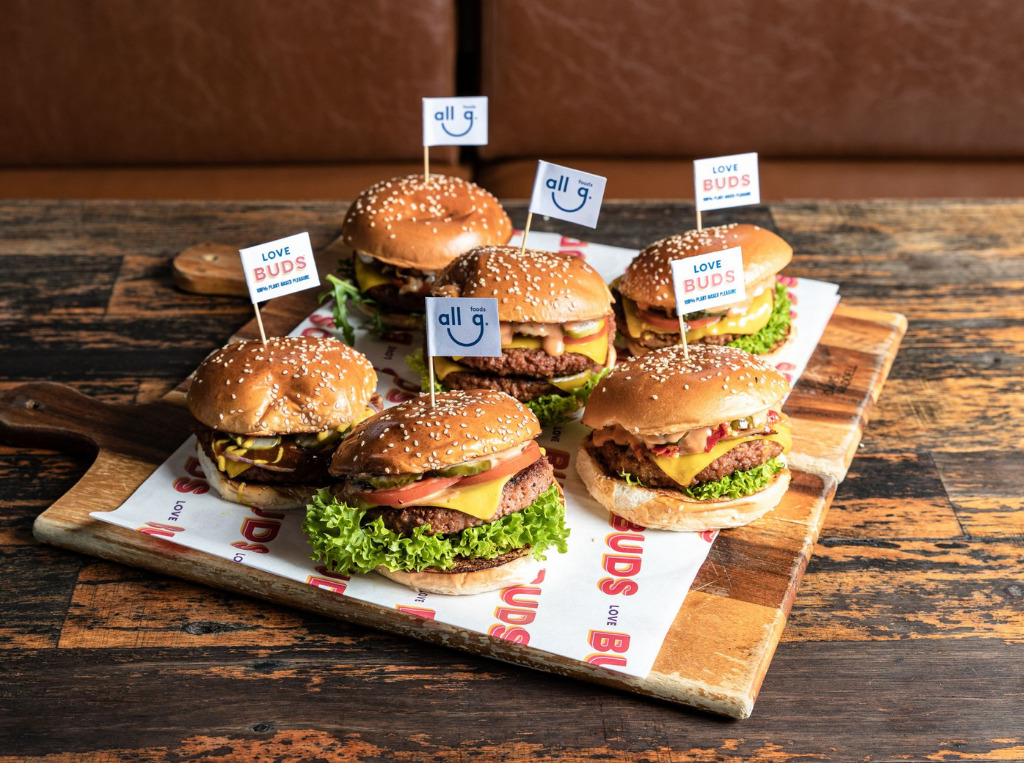
In October, Finnish alt-dairy brand Oddlygood acquired Nordic brand Planti, making it the market leader in vegan “spoonable snacks” in Sweden and cooking products in Finland. The same month saw US company Superlatus enter an agreement to buy plant-based dairy and egg company Spero, months after it agreed to purchase precision fermentation dairy leader Perfect Day's consumer brands under The Urgent Company umbrella. Also in October, German food conglomerate Pfeifer & Langen earned a majority stake in sausage-maker-turned-alt-meat brand Rügenwalder Mühle.
A month later, British artisanal vegan cheese maker Palace Culture was taken over by The Compleat Food Group (formerly Winterbotham Darby), which owns fellow plant-based brands Squeaky Bean and Vadasz, while Canada’s Protein Powered Farms bought Lovingly Made Ingredients, the plant protein extrusion facility built and previously owned by Meatless Farm.
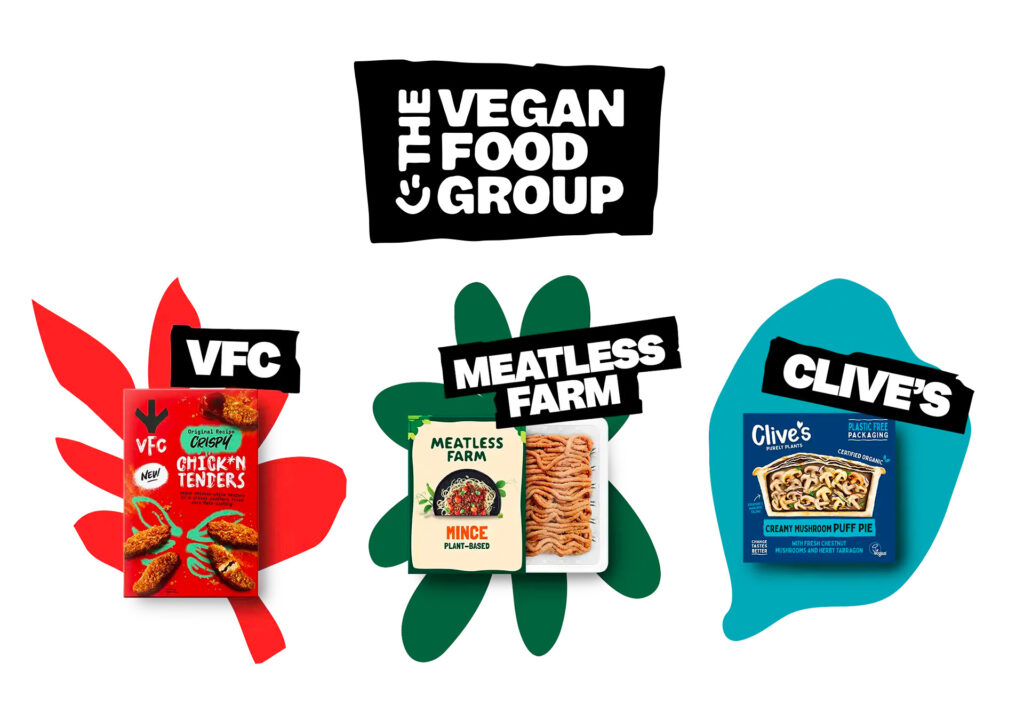
In December, Indian superfood brand Nourish You acquired alt-dairy startup One Good, in one of the country's largest plant-based M&A deals. And just earlier this month, vegan burger chain Next Level Burger purchased restaurant group Veggie Grill (alongside its Más Veggies taco chain) to expand its footprint to 27 locations. This came at the same time the UK's VFC turned into a holding company called the Vegan Food Group to step up its acquisitions, on the back of its purchase of Meatless Farm and Clive's Purely Plants last year.
The flurry of activity is explained by the industry outlook of Andy Shovel, co-founder of UK plant-based meat brand THIS. "We’re now at a stage where the sector is consolidating and poor-quality brands are coming out the market, with more brands consumers can trust and shelves that are way easier to navigate," he told Green Queen in October.
v2food an outlier in the global plant-based sector
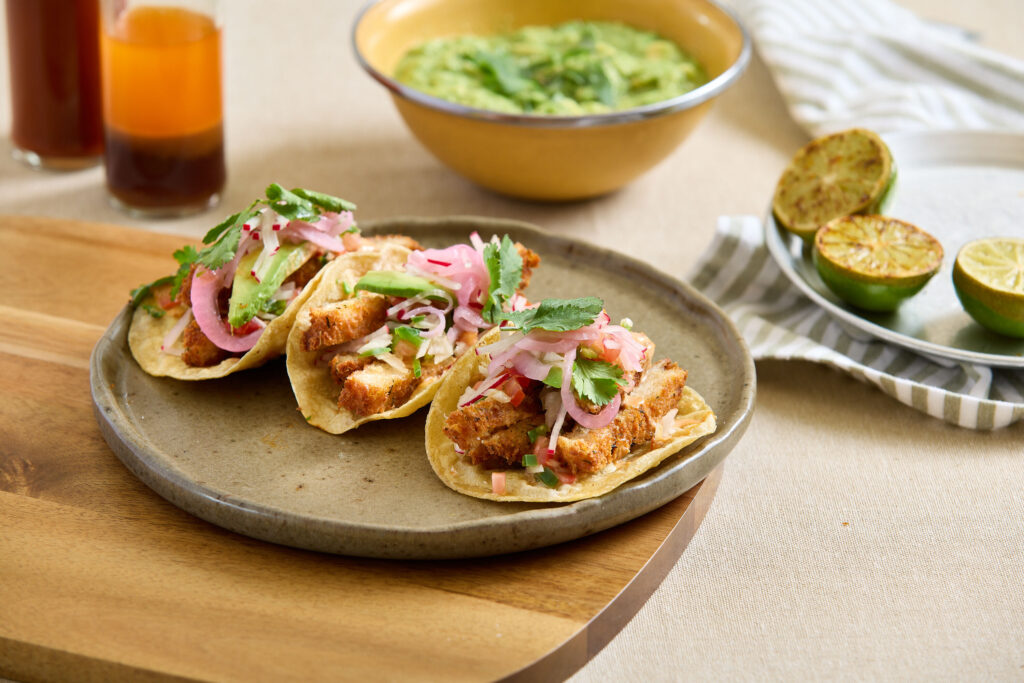
v2food's strategy mirrors that of the Vegan Food Group, according to Simon Eassom, executive director of Aussie alt-protein non-profit Food Frontier. The company is already the most-funded business in the plant-based Industry down under, having raised AU$185M ($138M) following Series B and B+ rounds in 2020 and 2021, respectively. It also has a multinational deal with Burger King, which uses its beef in the Rebel Whopper in the Philippines, Japan, South Korea, Thailand and, of course, Australia (under the Burger King franchise Hungry Jack's).
“Its acquisition of direct-to-consumer brand Soulara adds another channel in its go-to-market strategy," said Eassom. "We wouldn’t be surprised if there are further announcements from them in the ready meal space, and their push into the service sector with pies and other utility products ensures that v2food is consolidating its position as a major food producer."
He added: “v2food is doing something that few, if any, other major plant-based companies are doing anywhere around the world: branching into all channels with offerings to suit and doing it via mergers and acquisitions."

